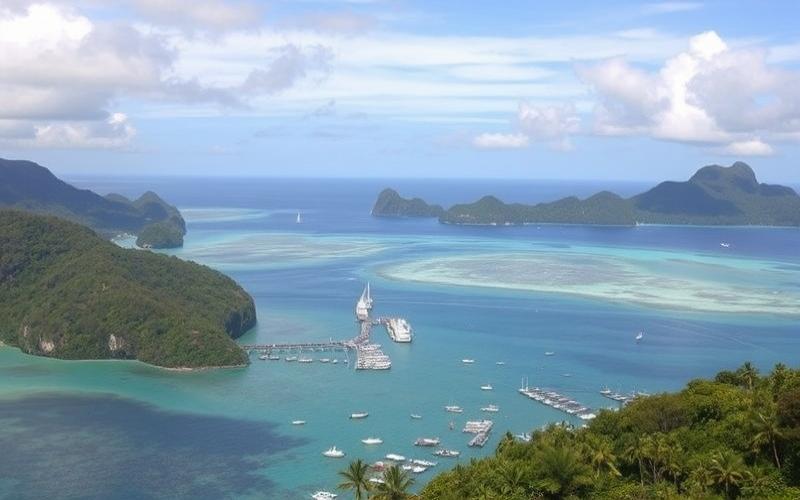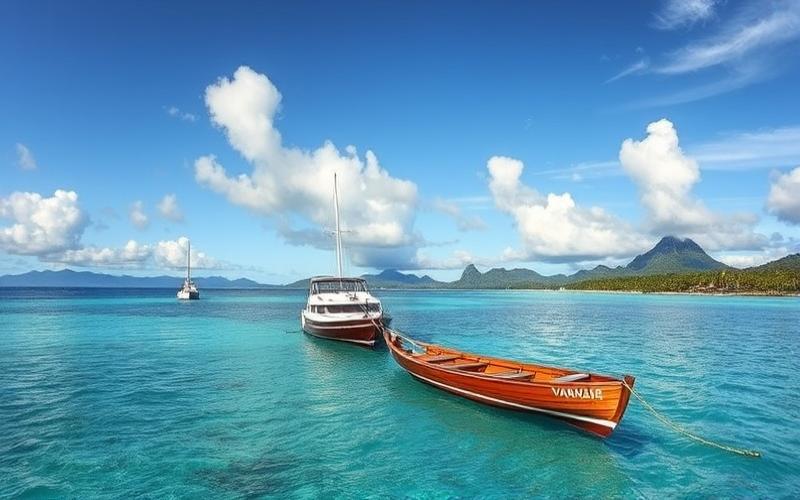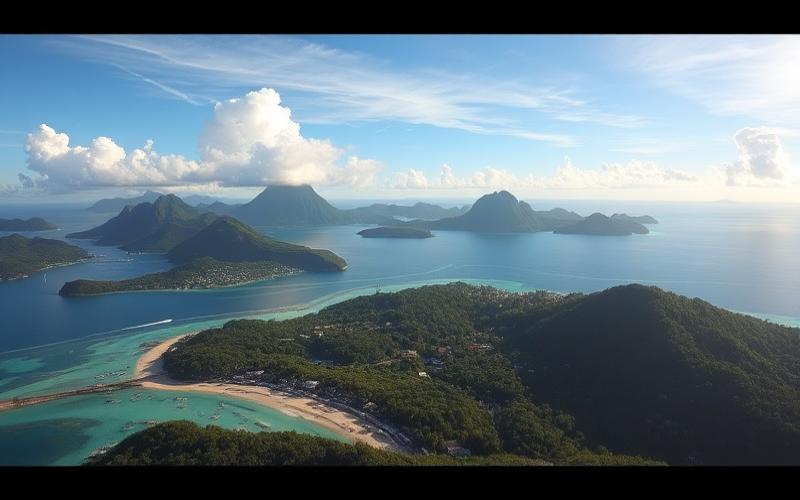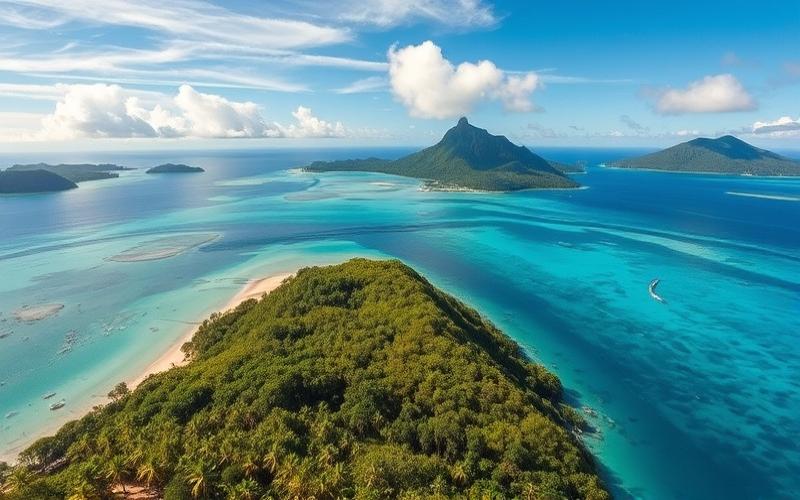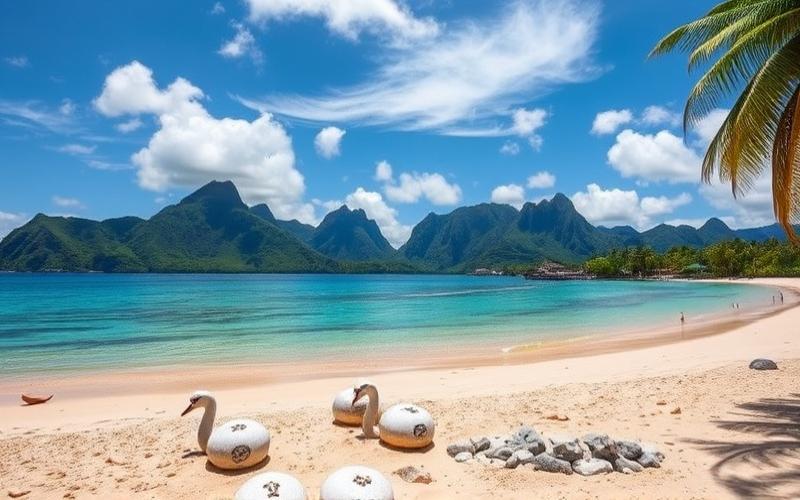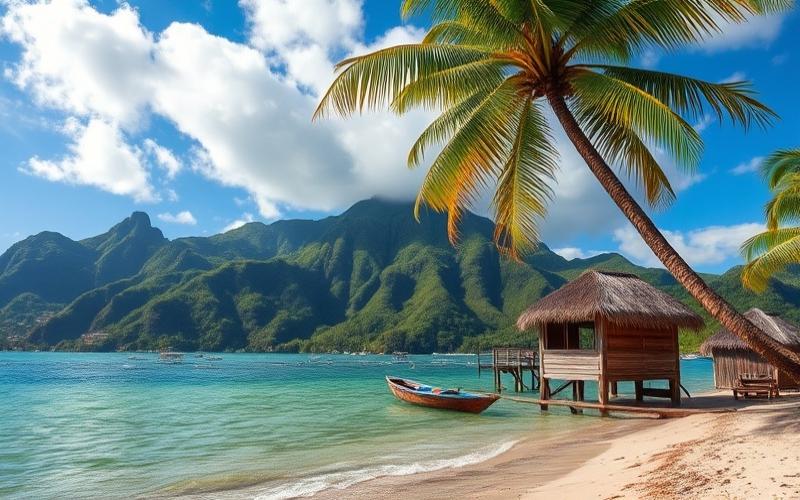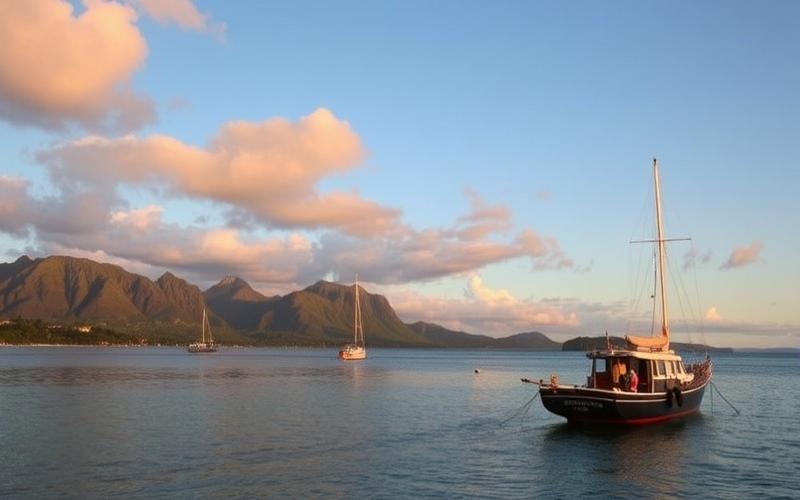
 Published on and written by Cyril Jarnias
Published on and written by Cyril Jarnias
Vanuatu, a tropical archipelago in the South Pacific, is much more than a paradise destination. It’s also a country experiencing rapid economic development, where business culture is of paramount importance for anyone looking to establish themselves professionally. Understanding the nuances of this unique culture will not only help you integrate better but also seize the opportunities offered by this emerging market. Let’s explore together the specifics of Vanuatu’s business culture—a fascinating blend of Melanesian traditions and modern influences.
The “Kastom” Spirit: The Heartbeat of Vanuatu’s Entrepreneurial Values
In Vanuatu, business culture is deeply rooted in the concept of “Kastom,” a term in Bislama (the local creole language) that encompasses customs, traditions, and ancestral values. This notion permeates all aspects of professional life, creating a unique work environment where respect for traditions coexists with modern ambitions.
Respect for elders and hierarchy is a fundamental value in Vanuatu businesses. Important decisions are often made by the oldest or most experienced individuals, who are considered guardians of wisdom. This approach may seem conservative to Western entrepreneurs, but it ensures stability and continuity that are locally appreciated.
Community solidarity is another pillar of business culture in Vanuatu. Companies are seen as integral parts of the community, with responsibilities that go beyond mere profit. It’s not uncommon to see local businesses involved in community projects or supporting social initiatives, thereby strengthening their roots in the social fabric.
Harmony and consensus are also key values. Open conflicts are generally avoided, and disagreements are resolved discreetly and respectfully. This approach may sometimes slow down decision-making processes, but it fosters a more serene and cohesive work environment.
Good to know:
The “Kastom” culture in Vanuatu profoundly influences the business world. To succeed, it’s essential to respect hierarchy, engage with the community, and prioritize harmony in professional relationships.
“Storian”: The Art of Communication Vanuatu-Style
Communication within Vanuatu businesses is a subtle art, deeply rooted in the country’s oral tradition. The concept of “Storian,” which literally means “storytelling” in Bislama, is at the heart of all professional interactions.
Indirect communication is preferred in many situations. Ni-Vanuatu tend to avoid direct confrontation and often prefer using metaphors or anecdotes to convey a message. This approach may seem confusing to foreigners accustomed to more direct communication, but it’s considered a mark of respect and diplomacy.
Informal meetings play a crucial role in professional life. Sharing a meal or a traditional drink like kava often provides an opportunity to discuss important topics in a relaxed setting. These “Storian” moments are essential for building trust and facilitating decision-making.
Active listening is a highly valued skill. In Vanuatu culture, listening carefully and thinking before responding is considered a sign of wisdom and respect. Interruptions or hasty responses may be perceived as inconsiderate.
According to a study conducted by the University of the South Pacific in 2024, 87% of Vanuatu employees consider the quality of internal communication to be a determining factor in their job satisfaction. This statistic highlights the crucial importance of mastering the art of “Storian” to succeed in the Vanuatu business world.
Good to know:
Communication in Vanuatu businesses is based on the concept of “Storian.” Prioritize an indirect approach, value informal exchanges, and practice active listening to integrate effectively.
The Modern “Big Man”: Leadership and Management Vanuatu-Style
Management style in Vanuatu is a fascinating fusion between the traditional concept of the “Big Man”—a community leader respected for wisdom and generosity—and modern management practices. This unique approach shapes how businesses are run and teams are managed.
Paternalistic leadership is widespread. Managers are often seen as father or mother figures, responsible not only for their teams’ professional performance but also for their overall well-being. This holistic approach to leadership creates strong bonds between employees and their superiors.
Collective decision-making is valued, although the manager retains final authority. Team meetings are frequent and serve to gather everyone’s opinions before an important decision is made. This participatory approach strengthens the sense of belonging and employee engagement.
Skills development is considered an important managerial responsibility. Vanuatu managers place great importance on training and mentoring their teams, thus perpetuating the tradition of knowledge transmission.
A survey conducted by the Vanuatu Chamber of Commerce and Industry in 2024 revealed that 72% of Vanuatu employees consider their manager to be a mentor, highlighting the importance of this paternalistic leadership style in the local business culture.
Good to know:
Management in Vanuatu combines the traditional “Big Man” concept with modern practices. Adopt a paternalistic leadership style, encourage collective decision-making, and invest in team development to succeed as a manager.
Unity in Diversity: Inclusion Vanuatu-Style
Vanuatu, with its 83 islands and over 100 vernacular languages, is a country of exceptional cultural diversity. This richness is reflected in business culture, where inclusion and celebration of diversity are fundamental values.
Equal opportunity is enshrined in the Vanuatu constitution and translates into the business world. Women are increasingly occupying positions of responsibility, although progress remains to be made. According to World Bank data, the share of women in management positions in Vanuatu increased from 27% in 2015 to 35% in 2024, demonstrating positive evolution.
Linguistic diversity is considered an asset. Although English, French, and Bislama are the official business languages, the ability to communicate in multiple vernacular languages is highly valued, especially for companies operating across multiple islands.
Integration of people with disabilities is receiving increasing attention. The Vanuatu government has implemented tax incentives for companies that employ people with disabilities, thereby encouraging greater inclusion.
Celebration of cultural diversity is an integral part of corporate life. Traditional holidays from different islands are often celebrated in the office, thereby strengthening team cohesion and mutual understanding.
Good to know:
Diversity and inclusion are key values in Vanuatu businesses. Value linguistic diversity, promote equal opportunity, and celebrate cultural differences to create an inclusive and high-performing work environment.
Engagement at Pacific Pace: Strategies for Motivating Vanuatu Teams
Employee engagement in Vanuatu is based on a unique combination of traditional values and modern aspirations. Successful companies are those that manage to align their engagement strategies with the specific expectations of the Vanuatu workforce.
Flexibility and work-life balance are increasingly valued. Companies that offer flexible hours or the possibility of remote work (when possible) see a significant increase in employee satisfaction and productivity. A study conducted by the Vanuatu Ministry of Labor in 2024 revealed that 68% of employees consider work flexibility to be a key factor in their engagement.
Recognition programs that incorporate local cultural elements are particularly effective. For example, some companies have implemented reward systems based on the traditional concept of “namele,” a symbol of respect and honor in Vanuatu culture.
Professional and personal development is a powerful driver of engagement. Companies that invest in continuous training and offer career advancement opportunities benefit from greater employee loyalty. According to a Vanuatu Chamber of Commerce survey, 82% of employees state that professional development opportunities are a determining factor in their decision to stay with a company.
Involvement in community projects strengthens employee engagement. Companies that encourage their teams to participate in local initiatives, such as environmental protection projects or support for island communities, see an increase in employee pride and engagement.
Transparent communication about company goals and performance is essential. Vanuatu employees appreciate being kept informed and understanding how their work contributes to the organization’s overall success.
Good to know:
To effectively engage Vanuatu teams, focus on flexibility, culturally adapted recognition programs, professional development, community involvement, and transparent communication.
Understanding and adapting to Vanuatu’s business culture is an exciting challenge that offers great opportunities for foreign entrepreneurs and professionals. By embracing the traditional values of “Kastom,” mastering the art of “Storian,” adopting a leadership style inspired by the modern “Big Man,” celebrating diversity, and implementing appropriate engagement strategies, you’ll lay the foundation for successful integration and fulfilling professional development in this multifaceted country.
Vanuatu offers a unique business environment where tradition and modernity meet, creating a dynamic and growing entrepreneurial ecosystem. With a deep understanding of its business culture, you’ll be well-equipped to navigate this emerging market and seize the opportunities it offers.
Remember that adaptability, respect for local traditions, and a genuine willingness to contribute to the country’s development are the keys to lasting success in Vanuatu. By integrating these elements into your professional approach, you won’t just adapt to Vanuatu business culture—you’ll become a valued and respected participant in it.
Disclaimer: The information provided on this website is for informational purposes only and does not constitute financial, legal, or professional advice. We encourage you to consult qualified experts before making any investment, real estate, or expatriation decisions. Although we strive to maintain up-to-date and accurate information, we do not guarantee the completeness, accuracy, or timeliness of the proposed content. As investment and expatriation involve risks, we disclaim any liability for potential losses or damages arising from the use of this site. Your use of this site confirms your acceptance of these terms and your understanding of the associated risks.

